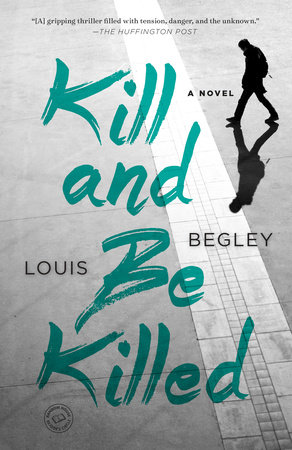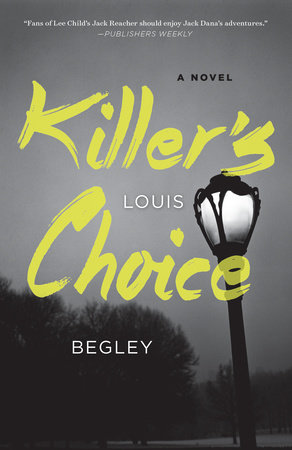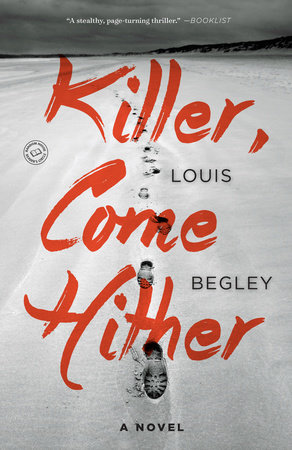Excerpt
Kill and Be Killed
Solitude, the charm of Torcello, the island in the Lagoon of Venice on which I had taken refuge after I left New York City, almost daily contemplation in the basilica of the great mosaic of the Last Judgment, and, above all, time had done their work. The wound caused by Kerry’s leaving me closed, but a blush of shame still came over my face when I recalled her parting words: I can’t stand the way you smell when you touch me, you smell of blood. But the wound and the hurt were slowly becoming an attenuated memory, like the recollection of my beautiful mother’s struggle with cancer and her long agony. For all the sorrow, I remained unable to muster any remorse for the way I killed Slobo. Yes, I had watched him bleed, and yes, I had made sure, before I called 911, that he had bled enough for the chances of his being alive and receiving a transfusion when the ambulance brought him from Sag Harbor to the hospital in Southampton to be nil. But the son of a bitch had tortured and killed my beloved uncle Harry, and tortured and killed his beautiful cat, whom I also loved. Was I to hand over that contract killer, wanted by Interpol and who knows how many other police forces, to the Suffolk County D.A. so he could plea-bargain his way to a twelve-, fifteen-year sentence? Never. I’d made no secret of my intention to kill Slobo. A tough, bright, big-time litigator like Kerry, with prosecutorial experience, should have found a way to let me know that if I didn’t play the game according to Hoyle she’d dump me, that self-defense, to which she allowed I was entitled in a confrontation with Slobo, meant only what New York law provided, using no more force than a reasonable man would think was reasonably needed. How was I to understand this new—it had to be new—squeamishness and sanctimony? I smelled of blood! Where was her fine olfactory sense when we first made love, and went on making love fervently, every night except when she had to be away for client meetings and when I went out of town twice, once to seek advice from my best friend, Scott Prentice, now working for the Agency in Langley, Virginia, and once to beard Abner Brown, the rightwing mogul and devil incarnate who’d sent Slobo on his murderous errand. Had she not smelled during those nights the blood of the men I’d killed in Iraq and Afghanistan, some of them in hand-to-hand combat? Or did her fine legal sense tell her that every killing by a Marine Corps Infantry officer and Force Recon platoon commander fighting the Global War on Terror is justified? I would stop these silent rants, realizing that they hurt me even more than Kerry’s rejection. The other side of that coin, the inescapable truth, was that, however much I fumed, I loved her no less than before.
I emailed her soon after arriving on Torcello, describing— since I knew she’d never seen it—the island’s eerie water logged landscape, the glories of the basilica, the refined rustic pleasures offered by the locanda at which I stayed, and screwed up my courage to add that I would be deliriously happy if she came to visit. Her answer was perhaps three lines long. It told me she was glad I had gone to a place so much to my taste and ignored the invitation to join me. I am embarrassed to say that I persevered. Not to the point, it would seem, of becoming enough of a nuisance for her to block my emails, but writing often enough about my daily life to get her to understand that she was very present in my thoughts. I wanted to avoid the impression that I dashed off notes to her when, like all professional writers who work on a computer, I needed a break and felt the urgent need to Google such red-hot subjects as Cabo Verde or the year in which Mother’s Day was first celebrated, or to send long-overdue emails to friends dwelling in the suburbs of my affection. Most of those messages remained unanswered.
I am a novelist. A large part of my first book, about the two wars I’d been to, in Iraq and Afghanistan, I wrote at the Walter Reed Army Medical Center, where surgeons repaired damage a sniper in Sangin had done to my pelvis. More novels followed. On Torcello, I began a book relating the story of Uncle Harry’s murder and the vengeance I exacted. Working on it made it impossible not to think about Kerry, not only because she was my girl during that time but also because she had been Harry’s protégée and his partner at the law firm and had led me to grasp why Abner Brown decided he had to get Harry out of the way. Turning those events over in my mind, I wrote to her again, at much greater length, explaining more lucidly, I hoped, than when I had argued with her face-to face why she should accept that Slobo had amply deserved to be killed as I had killed him, that what had been done could not be undone, and that we should not sacrifice our love to the chimera of legality. Her one-sentence answer came swiftly. It’s no use writing, Jack, she wrote, I’ve moved on. She signed “Kerry”—without a closing. No “Love” or “Be well” or “Regards”—but perhaps that was better. Loveless love and empty words might have stung more. But I was left with a tormenting question. What did she mean? Was she telling me that she had someone else and the rights and wrongs of her dismissing me on account of Slobo had become moot? Could she possibly mean that she had lost interest in Abner Brown and his empire of crime and no longer cared whether the road map for prosecutors Harry had prepared and that we handed over to the U.S. attorney ever landed him in jail? That couldn’t be. I followed avidly the proceedings brought against Abner’s companies by the SEC, the EPA, the IRS, and the Justice Department whenever they were reported in the press I read online. Simon Lathrop, a senior partner in Harry’s old firm, Jones & Whetstone, and Harry’s best friend going way back to Harvard Law School, emailed me with information appearing in specialized legal and business publications and gossip he picked up. Although Abner Brown himself was not yet under direct attack, his companies were besieged, and the government wasn’t sparing its ammunition. How could she have lost interest? That left a hypothesis that I thought was wildly optimistic but was unwilling to abandon. She was telling me through this message, so curt and brusque because she was too proud to admit she had changed her mind, that she was ready to let the past be the past. Only I would have to plead my case in person. The U.S. government had been shut down for three days, since Tuesday, and no one could predict how long the shutdown would continue, but air traffic controllers remained on the job, keeping—one hoped—their eyes on those computer screens. It was time to take Kerry in my arms, to inhale the head-spinning mixture of soap and fresh sweat that wet her armpits as soon as she was aroused. I had voted by absentee ballot for Obama and was elated by his victory. Ever since, it had seemed to me that the country that had made so decisively the right decision had gone mad. How many times had the House Republicans voted to repeal Obamacare? Twenty-five? Thirty? Was there any measure that carried the country’s work forward around which they would coalesce? I didn’t think that going home would give me a clearer picture, but I was returning for the most important affair of my life, to win Kerry back and not out of some half-baked sense of civic duty. I had given seven years of my life to unstinting service on the battlefield. Basta così! Those that remained would be devoted to my books and loving Kerry. I bought a seat on a direct flight from Venice’s Marco Polo to JFK for the following Tuesday and alerted to my arrival Harry’s housekeeper, Jeanette, who had been with him for decades and had agreed to stay and work for me.
As flies to wanton boys are we to the gods; they kill us for their sport. Early October may be the most agreeable season in Venice and on Torcello. The air is mild. The rare tourists are apt to be serious people, interested in architecture and art. They speak in low voices. On Sunday I was having what I thought of as my farewell lunch of pasta
frutti di mare and a Friuli white wine in the garden of my
locanda when my cell phone rang. It was pure chance that I had turned it on and put it in the pocket of my jacket. Most of the time I left it on the worktable in my room. The reception was spotty, no one telephoned me, and I used my cell phone, if at all, to check on email when I was away from the
locanda. My heart leaped with excitement when I saw in the caller-ID window Simon Lathrop’s name. I was sure he was calling because there had been an important development in the government litigation against Abner Brown’s companies. Still, calling on Sunday . . . As soon as I heard his voice, quavering and weak, I knew I was wrong. This wasn’t about litigation.






